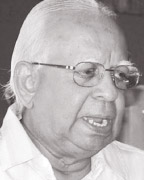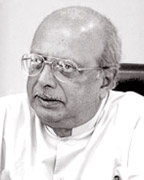Rearing its ugly head again?
 When
the leader of the Tamil National Alliance (TNA), Rajavarothiam
Sampanthan MP raised the Lion Flag on May Day, it was widely believed
that this represented a change of heart among previously separatist
Tamil politicians. When
the leader of the Tamil National Alliance (TNA), Rajavarothiam
Sampanthan MP raised the Lion Flag on May Day, it was widely believed
that this represented a change of heart among previously separatist
Tamil politicians.
Sampanthan was widely criticised for this action in the organs of the
rump of the Liberation Tigers of Tamil Eelam (LTTE) in the Tamil
Diaspora. It was thought that the TNA would ditch the separatist agenda
and shift to one in which the fight for ethnic Tamil rights would be
within a united Sri Lanka.
Alas, it was not to be. The main constituent part of the TNA, the
Ilankai Tamil Arasu Katchi (ITAK) - which has taken on the mantle of the
Federal party (FP), which had that name (meaning 'Sri Lanka Tamil Rule
Party' in Tamil) earlier - held its 14th annual convention in Batticaloa
last month. It was widely expected that ITAK constitution would be
amended to remove from it indications that secession was the party's
ultimate aim. However, the creation of Tamil- and Muslim-ruled entities
as goals of the party remained in the ITAK constitution, unchanged and
untouched by the convention.
Mathiaparanan Abraham Sumanthiran MP, the ITAK's legal and foreign
affairs secretary told the Chennai-based Hindu newspaper that his
party's goals were 'establishing of a unitary Tamil State and a unitary
Muslim State and achieving political, economical and cultural freedom of
the Tamil speaking community'.
Political structure

R. Sampanthan, MP |

Minister Prof Tissa Vitharana |

Erik Solheim |
He did, though, clarify later that the original Tamil wording of the
ITAK constitution specified autonomy or self-rule and not the creation
of separate countries. The Sixth Amendment to the Sri Lanka constitution
bars from Parliament those who demand the establishment of a separate
state within the territory of Sri Lanka.
Sumanthiran had previously told a seminar in Jaffna that the TNA did
not support a separate state of Tamil Eelam and had not included this
demand in its manifesto.
Nonetheless, the address made by Sampanthan to the Batticaloa
Convention was somewhat ambiguous, to say the least. He said that: 'Our
hope for a solution to the problems of those in the North and the East
the sovereignty of the Tamils is based on a political structure outside
a unitary government, in a united Sri Lanka in which the Tamils have all
the powers of government needed to live with self-respect and
self-sufficiency. We believe that only within such a structure of
government can the Tamils truly enjoy the right to internal
self-determination - their inalienable right.'
So far, so good. Unfortunately, a little later he said that they
'must prove to the international community that we will never be able to
realize our rights within a united Sri Lanka' and that 'the current
practices of the international community may give us an opportunity to
achieve, without the loss of life, the soaring aspirations we were
unable to achieve by armed force'.
International community
This seems appallingly as if the grand aims of the LTTE, which they
failed to achieve by terrorism, are those which the ITAK wishes to
achieve through the intervention of the 'international community' - and
that the 'international community' is indeed co-operating in this
matter.
Indeed, the TNA appears to be playing mainly to foreign audiences.
Its strategy appears to be broadly similar to that which the Roman
dictator Quintus Fabius Maximus (nicknamed Cunctator - 'delayer') used
against the brilliant Carthaginian General Hannibal Barca, which was to
delay and provoke.
National question
The ITAK and the TNA are employing cunctatorial tactics against the
government, in order to prove to the 'international community' that the
latter is obdurate. Confirmation of this came with Sampanthan's speech,
wherein he said 'Once we have reached the limits of our patience, we
will move onto the next stage of our efforts'.
Further confirmation came last week when Senior Minister and former
All Party Representatives Committee chairman Prof Tissa Vitharana said
that the TNA was demanding pre-conditions to attend the proceedings of
the Parliamentary Select Committee (PSC) to find a political solution to
the national question.
Sampanthan's demands, he said, were the same as those made by the
LTTE in November 2003 when they demanded an Interim Self-Governing
Authority in the North and East. These included the unification of the
North and East provinces and control of such subjects as Police powers,
media, education, power generation, state lands, mineral resources, sea
ports, foreign investment, financial institutions and a wide variety of
taxes.
He said that these demands were unacceptable as preconditions. All
parties, including the government and the TNA should participate in the
deliberations of the PSC in a spirit of goodwill and cooperation and
with no preconditions to reach a workable political solution to the
ethnic issue.
Pro-terrorist pressures
Undoubtedly, the TNA and ITAK are under pressure from outside forces,
particularly from the rump-LTTE. For example, last month, former
Norwegian minister and former peace facilitator Erik Solheim took part
in a seminar in Oslo, sharing the platform with TNA parliamentarian
Arumugam Kandaiah ('Suresh') Premachandran.
In his speech he said there was an ongoing process to bring about a
rapprochement between the Sri Lankan government and Tamil
representatives. He advised Tamils to abjure separatism and renounce
violence, and instead fight for equal and fair treatment and autonomy in
Tamil-majority areas.
Tamilnet, the website representing the Diasporic hegemons, promptly
attacked Solheim for joining 'the orchestration against independence'
for and 'supporting the annihilation of the ancient nation of Eezham
Tamils'. The website was, on the other hand, full of praise for
Premachandran, who certainly did not pull his punches.
In bowing to such pro-terrorist pressures, the TNA should bear in
mind the dangerous path it is riding. It should remember the words of
TerryWaite, the Anglican Church envoy who was held hostage: 'The
terrible thing about terrorism is that ultimately it destroys those who
practise it. Slowly but surely, as they try to extinguish life in
others, the light within them dies.' |



